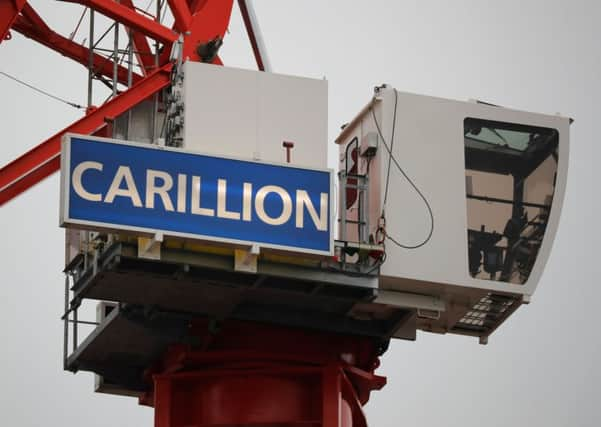Bill Jamieson: Cautious culture stops the Footsie baring its FAANGs


Does not our very own financial Chamber of Horrors, the Library of Mistakes in Edinburgh’s New Town, testify to the failures and excesses of unbridled capitalism? If only the cycle could be smoothed, the excesses minimised and the downturns avoided by better planning, regulatory governance and stewardship.
But there is a contrary view, not heard as often as it should be: that we are being let down economically and socially, not by reckless, untrammelled capitalism but by a risk-avoiding, safety-first corporate culture that has stifled innovation and enterprise and condemned us to the slow lane of growth.
Advertisement
Hide AdAdvertisement
Hide AdWhen it comes to the venture capital risk-taking that has driven massive change across the business and everyday world, it is not to the UK we look, but to today’s digital and information technology giants, and particularly the Famous Five “FAANGs”: Facebook, Amazon, Apple, Netflix and Google. All of them transformative, all of them disruptive – and all of them American.
Where are the UK equivalents in the FTSE 100? They are thin on the ground because our dominant corporate culture does not favour them. Our leading index of quoted companies is dominated in the main by companies that have remained highly conservative in their business policies and methodology.
The prevailing orthodoxy is focused on predictability: the meeting of short-term targets for earnings, the maintenance of dividend payments to reassure the private investor and the pension funds, and the raising of corporate and governance protocols to the status of a cargo cult.
But this has not protected us from shock. Within this universe of the low-challenge strategy and safety first, there are spectacular corporate failures: companies whose relatively straightforward functions and workloads are broken on the wheel of poor management and misappreciation of risk. There are honourable exceptions to this rule, but sadly not many.
The investment guru, John Baron, author of the Financial Times Guide To Investment Trusts, recently raised searching questions in the Investors Chronicle about the dearth of innovation in the UK’s largest quoted companies. They have a poor track record of commercialising innovation and scaling up compared with many of their international rivals.
This, he writes, “is not helped by an ingrained financial system too focused on short-term returns and targets… The management of our big companies has generally lacked vision, certainly when it comes to commercialising innovation. From Quorn to computers, technology to biotechnology, the country has produced creative ideas but failed to commercialise them in scale.
“Where are the British equivalents of the US FAANGs, the German manufacturers or Chinese technology giants? Instead, we have seen a long series of corporate disasters, including the financial crisis… The answer perhaps reveals a malaise at the heart of our economy. And the worst may be still to come.”
This, he argues, is why the FTSE 100 index has made so little progress in capital terms over the past 20 years, while the US S&P Index has returned nearly 80 per cent over the same period. Little wonder Baron has had a preference for smaller companies where long-term outperformance relative to the FTSE 100 has been evident for some time.
Advertisement
Hide AdAdvertisement
Hide AdThe problem is compounded by the phenomenon of “early exit” – promising entrepreneurial companies succumbing to overseas takeover approaches, or opting to go private, which may result in lesser visibility for entrepreneurship.
We prefer sustainability to the excitement of shooting stars. But it is not as if the concentration on corporate governance and humdrum business models has been free of catastrophic failure. Carillion was a construction and infrastructure giant, undertaking many government and public works programmes – yet it succumbed to spectacular collapse. Shareholders in Interserve have been all but wiped out in a debt for equity reconstruction.
And advocates of greater government participation and oversight should guard against finger-wagging: examples abound of costly ventures undertaken for disputed public benefit: the HSR project, with cost projections heading towards £100 billion, is one example.
And bank behaviour generally still leaves much room for improvement ten years on from the financial crisis after shocking scandals ranging across Libor and foreign exchange market rigging.
Standard Chartered revealed last week that it is putting aside £690 million for potential fines involving investigations in Britain and the US. Barclays took charges of £2.2bn last year to cover legal issues and fines, including a large settlement with US regulators and, in the UK, there was further compensation over Payment Protection Insurance (PPI) claims. Lloyds Bank has set aside another £750 million, having paid out £1.86bn last year.
Mis-sold PPI is the biggest and most expensive mis-selling scandal in the history of UK consumer financial services. The total cost of the scandal is now reckoned at more than £44bn. Given this, it is not surprising that we lean heavily towards ever higher standards of governance, regulation – and corporate caution.
Bazooka update
Two weeks ago, I wrote here of how Chancellor Philip Hammond may be priming a financial bazooka to fire in the event of a Brexit “no-deal” economic trauma on 29 March. Now comes news of the ammunition he has available to fire. Latest figures on the public finances show January’s surplus on the public finances rose sharply to a record high of £14.9bn, up from £9.3bn a year earlier, buoyed by strong tax receipts.
There was a budget deficit of £21.2bn over the first 10 months of fiscal year 2018/19, down an impressive 47 per cent year on year and the best performance for 17 years. If the pattern is continued over the full fiscal year, the budget deficit will come in at £22.3bn – the lowest since 2001/2.
Fusilier Hammond could hardly wish for a better boost to his armoury ahead of his Spring Statement due on 13 March.